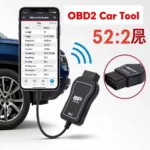Car body work, whether it’s a minor scratch repair or a major restoration project, requires the right tools for car body work to achieve professional results. From simple hand tools to more complex power tools, having the appropriate equipment can make the difference between a flawless finish and a botched job. This guide will explore the essential tools for car body work, helping you understand their uses and benefits. We’ll also address common questions and provide helpful resources. After reading this guide from DiagFixPro, you will be well-equipped to tackle your next car body work project with confidence.
Understanding the Basics of Car Body Work Tools
Before diving into the specifics, it’s crucial to grasp the fundamental categories of tools for car body work. These can be broadly classified as tools for shaping, smoothing, and finishing. Shaping tools, such as hammers and dollies, are used to manipulate the metal back to its original form. Smoothing tools, including sanding blocks and files, help refine the surface and prepare it for painting. Finally, finishing tools like polishing pads and buffers bring out the shine and protect the paintwork. Knowing the purpose of each tool is the first step toward mastering car body work.
Choosing the right tools also depends on the nature and extent of the damage. Minor dents might only require a few basic hand tools, whereas more significant damage will necessitate the use of specialized power tools like welders and grinders. If you’re looking to expand your toolkit for car DIY projects, check out our guide on tool car diy. A well-stocked toolbox will save you time, effort, and money in the long run.
Essential Hand Tools for Car Body Work
Hand tools are the backbone of any car body work project. They offer precision and control, especially for delicate tasks. Here are some must-haves:
- Hammers and Dollies: These are indispensable for removing dents and shaping metal. The dolly provides a backing surface while the hammer shapes the metal.
- Body Files: These come in various shapes and sizes, designed for smoothing and shaping metal. They’re particularly useful for removing imperfections and refining curves.
- Sanding Blocks and Papers: These are essential for smoothing surfaces and preparing them for paint. Different grits of sandpaper are used for different stages of the process.
- Putty Knives and Spreaders: These are used for applying and smoothing body filler, which fills dents and imperfections before painting.
- Screwdrivers and Wrenches: These are essential for removing and installing various car parts, providing access to damaged areas.
These hand tools form the foundation of any car body work kit. While power tools offer speed and efficiency, the precision and control provided by hand tools remain invaluable. For those interested in specialized tools for car sanding, visit our page on the best sanding tool for car. Having the right sanding tools can significantly impact the final finish of your car body work.
Power Tools for Enhanced Efficiency
Power tools significantly enhance efficiency, particularly for larger jobs or repetitive tasks. They can save time and effort, making complex tasks more manageable. Here are some key power tools for car body work:
- Sanders: From orbital sanders to belt sanders, these tools accelerate the sanding process, smoothing surfaces quickly and effectively.
- Grinders: These versatile tools can be used for cutting, grinding, and polishing metal. They are crucial for removing rust and preparing surfaces for welding.
- Welders: Essential for joining metal pieces together, welders are a must-have for more serious body repairs.
- Polishers and Buffers: These tools bring out the shine in the paintwork, achieving a professional finish.
- Air Compressors: These power a variety of pneumatic tools, including impact wrenches, sanders, and spray guns, enhancing efficiency and versatility.
Understanding the capabilities and limitations of each power tool is crucial for achieving optimal results and avoiding potential hazards. Power tools can significantly speed up the process, but safety precautions should always be prioritized.
Choosing the Right Tools for the Job
Selecting the appropriate tools depends on the specific task at hand. For example, repairing a small dent might require only a hammer, dolly, and some body filler, whereas a major collision repair would necessitate a welder, grinder, and various other tools. If you’re looking for reputable manufacturers of dent repair tools, explore our guide on car dent repair tool manufacturer. Finding reliable tool manufacturers ensures you’re investing in quality equipment. The type of metal being worked on also influences tool choice. Aluminum, for instance, requires different tools and techniques compared to steel.
For those working on specialized car body projects, such as shaping a pinewood derby car, we recommend checking out our dedicated guide on tools to shape pinewood derby car. Using the right tools for specific projects ensures efficient and accurate results. Having the right tools for car body work will significantly impact the quality and efficiency of your work. Investing in quality tools is a wise decision that will pay off in the long run.
Conclusion
Having the correct tools for car body work is essential for achieving professional-looking results. From basic hand tools like hammers and dollies to more advanced power tools like welders and grinders, each tool plays a vital role in the repair and restoration process. Understanding the function of each tool and choosing the appropriate one for the task will ensure a successful outcome.
FAQ
- What are the basic hand tools for car body work?
- What power tools are commonly used in car body repair?
- How do I choose the right sandpaper grit for car body work?
- What safety precautions should I take when using power tools for car body work?
- Where can I find reliable car body work repair tools?
Check out our comprehensive guide on car bodywork repair tools for a more in-depth understanding of tools and techniques.
For further assistance, please contact us via WhatsApp: +1(641)206-8880, Email: [email protected] or visit us at 910 Cedar Lane, Chicago, IL 60605, USA. Our 24/7 customer support team is ready to assist you.

